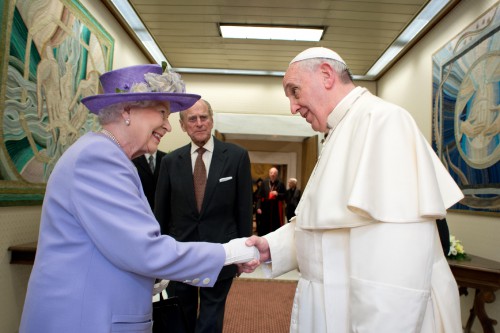3rd April 2014
Queen Elizabeth II meets Pope Francis

Back in February, I wrote about the significance of the relatively few meetings over the years between British monarchs and Popes, not least The Queen’s own encounters with four different Popes since 1951. Each in its way has served as a milestone in the development of the relationship between the United Kingdom and the Holy See. Today’s meeting between The Queen and Pope Francis, the fifth Pope Her Majesty has met personally, was no exception.
Each is different, every such meeting is an event, and I felt privileged to be a witness to today’s encounter. In 2000, Her Majesty came to Rome to celebrate with Pope John Paul II the Year of the Great Jubilee, an unprecedented third meeting between them. In 2010, Pope Benedict was welcomed by The Queen and The Duke of Edinburgh at Holyroodhouse in Scotland, as he arrived in Britain for the first State Visit by a Pope to our shores (the 1982 visit of John Paul II was a pastoral one). Today, we saw a different kind of meeting: informal, warm, spontaneous, personal, an expression of the deep mutual respect between the Papacy and the Monarchy, Britain and the Holy See, Pope Francis and The Queen.
It is extraordinary to think of the distance travelled since Her Majesty’s first visits to Rome in 1951 as Princess Elizabeth, when she had an audience with Pope Pius XII, and 1961 on a State Visit to Pope John XXIII. The Second Vatican Council had not yet met, with all that that has since meant for ecumenical dialogue and understanding between the Roman Catholic Church and the Anglican Communion. We did not have a full Ambassador to the Holy See, an indication still of the unease in certain quarters in the United Kingdom and the Vatican about going the extra mile in a relationship beset for centuries by dark shadows, misunderstanding and suspicion.
Things have changed during Her Majesty’s reign, and that change has in no small measure been inspired by The Queen and through each, very different, Papal meeting. In 2014, I am already the ninth British ambassador to have presented my credentials from The Queen to the Pope; the Archbishop of Canterbury, Justin Welby, will shortly be making his second visit to the Vatican in only his second year in office.
The Royal family serves to uphold the values of democracy, faith, culture and family that are the bedrock of British society. Pope Francis has called for Catholics and all people of good will to play their part in serving their community, their family and their neighbour. His gift of a cross of St Edward, our great royal saint, inscribed to Prince George, is a mark of his recognition that these values must be transmitted from one generation to the next if we care for the survival and flourishing of our civilisation. It also shows his deep appreciation that The Queen, throughout Her Majesty’s life, has been an exemplar of such values.
I am very happy with the fact that respect and love are the keys to reinforce the bond between these two grandiose
persons.
Warmest wishes to all of you.
Francine Deschênes
An erratum in above comment:- Her Majesty’s Ambassador, not His Majesty’s Ambassador.
Predictable tosh from His Majesty’s Ambassador to the Holy See. Most disappointing.
HMA Baker studiously avoids any mention of the issue of the Falkland Islands/Malvinas. Yet this one subject has been uppermost in the minds of commentators and public alike in the lead-up to today’s historic meeting between an English Queen and an Argentine Pope. Between them they could settle the matter. That fact alone must be galling to the Foreign Office.
The position of the Foreign Office respective of Argentina is deeply troubling because it is one of deceit. The Foreign Office cannot expect to conduct business as usual with Argentina, nor with the rest of the “patria grande” of South America while it maintains the lie of self-determination for the Falkland Islanders.
A fantastic precis and superb to see how two such great and major world leaders as Pope Francis and Our Queen can be relaxed, informal and show confidence in themselves, each other and the bond between our two countries. Great Cardinal Cormac was there.